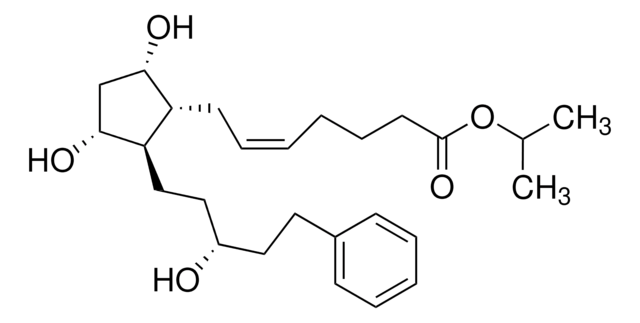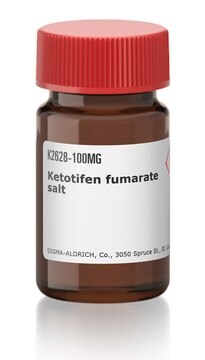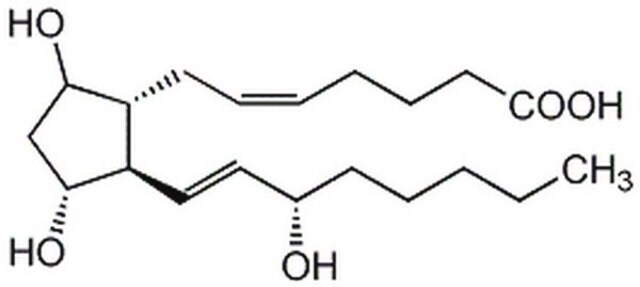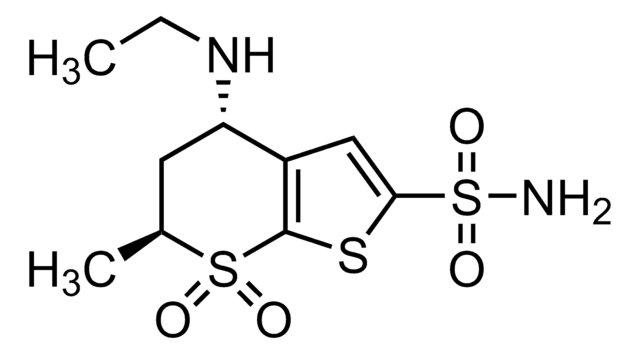L1167
Latanoprost
≥98% (HPLC)
Synonym(s):
Isopropyl (5Z,9α,11α,15R)-9,11,15-trihydroxy-17-phenyl-18,19,20-trinor-prost-5-en-1-oate, Isopropyl (Z)-7-[(1R,2R,3R,5S)-3,5-dihydroxy-2-[(3R)-3-hydroxy-5-phenylpentyl]cyclopentyl]hept-5-enoate, Xalatan
About This Item
Recommended Products
Quality Level
Assay
≥98% (HPLC)
form
oil
color
colorless to yellow
solubility
DMSO: freely soluble
methanol: soluble
originator
Johnson & Johnson
shipped in
wet ice
storage temp.
−20°C
SMILES string
CC(C)OC(=O)CCC\C=C/C[C@H]1[C@@H](O)C[C@@H](O)[C@@H]1CC[C@@H](O)CCc2ccccc2
InChI
1S/C26H40O5/c1-19(2)31-26(30)13-9-4-3-8-12-22-23(25(29)18-24(22)28)17-16-21(27)15-14-20-10-6-5-7-11-20/h3,5-8,10-11,19,21-25,27-29H,4,9,12-18H2,1-2H3/b8-3-/t21-,22+,23+,24-,25+/m0/s1
InChI key
GGXICVAJURFBLW-CEYXHVGTSA-N
Gene Information
human ... PTGFR(5737)
Looking for similar products? Visit Product Comparison Guide
Application
- in the preparation of thermo-sensitive hydrogel consisting of curcumin-loaded nanoparticles (CUR-NPs) to determine its therapeutic effects on human trabecular meshwork (TM) cells under oxidative stress.
- as an ester pro-drug to study its effects on the murine ocular surface in mice.
- in the preparation of thermo-sensitive hydrogel to study its effects on controlling ocular hypertension.
Biochem/physiol Actions
Features and Benefits
Signal Word
Warning
Hazard Statements
Precautionary Statements
Hazard Classifications
Repr. 2
Storage Class Code
10 - Combustible liquids
WGK
WGK 3
Flash Point(F)
Not applicable
Flash Point(C)
Not applicable
Personal Protective Equipment
Choose from one of the most recent versions:
Certificates of Analysis (COA)
Don't see the Right Version?
If you require a particular version, you can look up a specific certificate by the Lot or Batch number.
Already Own This Product?
Find documentation for the products that you have recently purchased in the Document Library.
Customers Also Viewed
Articles
Discover Bioactive Small Molecules for Lipid Signaling Research
Discover Bioactive Small Molecules for Lipid Signaling Research
Discover Bioactive Small Molecules for Lipid Signaling Research
Discover Bioactive Small Molecules for Lipid Signaling Research
Our team of scientists has experience in all areas of research including Life Science, Material Science, Chemical Synthesis, Chromatography, Analytical and many others.
Contact Technical Service











